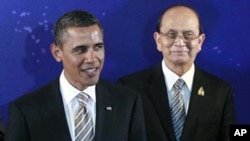"For decades, Americans have been deeply concerned about the denial of basic human rights for the Burmese people," U.S. President Barack Obama said recently in Bali, Indonesia. "We have always had a profound respect for the people of Burma and the promise of their country -- a country with a rich history, at the crossroads of East and West; a people with a quiet dignity and extraordinary potential."
For many years, both the promise and the persecution of the Burmese people have been symbolized by Aung San Suu Kyi, the leader of Burma's democratic opposition. "As the daughter of Burma’s founding father, and a fierce advocate for her fellow citizens, she's endured prison and house arrest, just as so many Burmese have endured repression," President Obama said. "Yet after years of darkness, we've seen flickers of progress in these last several weeks."
The President of Burma and the Burmese Parliament have taken steps toward political reform. A dialogue between the government and Aung San Suu Kyi has begun. Some political prisoners have been released. Media restrictions have been relaxed, and legislations have been approved that could open the political environment.
"There's far more to be done," President Obama said. "We remain concerned about Burma’s closed political system, its treatment of minorities and holding of political prisoners, and its relationship with North Korea. But we want to seize what could be an historic opportunity for progress, and make it clear that if Burma continues to travel down the road of democratic reform, it can forge a new relationship with the United States of America.
"I spoke to Aung San Suu Kyi," President Obama continued. "She supports American engagement to move this process forward. So . . . I've asked Secretary Hillary Clinton to go to Burma . . . and she will explore whether the United States can empower a positive transition in Burma and begin a new chapter between our countries."
"That possibility will depend upon the Burmese government taking more concrete action," President Obama concluded. "If Burma fails to move down the path of reform, it will continue to face sanctions and isolation. But if it seizes this moment, then reconciliation can prevail, and millions of people may get the chance to live with a greater measure of freedom, prosperity, and dignity."
President Obama On Burma

"After years of darkness, we've seen flickers of progress in these last several weeks."



